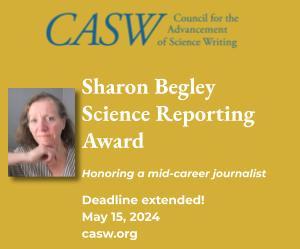COUNCIL FOR THE ADVANCEMENT OF SCIENCE WRITING
FOR IMMEDIATE RELEASE
September 15, 2014
Contact: Rosalind Reid, Executive Director
617-702-2798
ros@casw.org
NEW YORK TIMES REPORTER ELISABETH ROSENTHAL RECEIVES 2014 VICTOR COHN PRIZE FOR MEDICAL SCIENCE REPORTING
New York Times reporter Elisabeth Rosenthal, a physician and newspaper correspondent for 20 years, is the recipient of the 2014 Victor Cohn Prize for Excellence in Medical Science Reporting.
Rosenthal was cited for her exemplary coverage of health care economics and pricing in the United States and her groundbreaking, ongoing Times series, “Paying Till It Hurts.” The Cohn Award judges lauded “her ability to translate and humanize the nation’s mind-numbingly complex health care system and the extraordinary personal, financial and public health toll of the country’s $2.8 trillion annual bill.”
Rosenthal, they wrote, “not only investigates and documents the often exorbitant price tags of common medical procedures and treatments — from colonoscopies to childbirth — but also produces sublimely accessible multimedia stories that touch and matter greatly to patients, health care professionals and policy makers.”
Marking its 15th year, the Victor Cohn Prize is given for a body of work published or broadcast within the last five years. The Council for the Advancement of Science Writing, (CASW), a not-for-profit organization of journalists and scientists committed to improving the quality of science news and information reaching the public, administers and bestows the Prize.
Rosenthal will receive a $3,000 award and certificate at a ceremony in Columbus, Ohio, on Saturday, October 18, to be held during ScienceWriters2014, a meeting jointly organized by CASW and the National Association of Science Writers (NASW).
“Everybody knows the top line: health care is extraordinarily expensive in this country. Rosenthal breaks fresh ground in explaining why we have the costly system we have,” said the judges. They were particularly impressed by Rosenthal’s “epic reportorial skills and enterprising approach, combining dogged field reporting, medical database mining, and digital crowd-sourcing to find patients with compelling tales of their own experiences with the out-of-control American health care system.“
Launched in 2013, Rosenthal’s series to date has included eight major installments as well as more than a dozen related follow-up articles, interactive graphics, videos, photographs and reader comments in a digital presentation that “attracted tens of thousands of comments, the most for a series in the New York Times history,” according to the paper’s assistant managing editor, Rebecca Corbett.
“Rosenthal pioneered the use of new forms of reader engagement, developing directed discussion questions, a Facebook group and even online quizzes like ‘Is this a Hospital or a Hotel?’ urging Americans to reflect on and share their experiences with a high-priced medical system. And their comments were collected into a database that became an invaluable reporting tool,” noted Corbett.
In her nomination letter, Corbett praised the series for telling “the surprising back stories of America’s inflated medical bills — the highest in the world, though the outcomes are often worse than in other developed countries.” She said Rosenthal’s stories “were filled with eye-popping examples of how providers extract profits in a health care market where pricing is largely unregulated, and where neither doctors nor patients typically know prices in advance.”
The series had tremendous impact on multiple fronts, noted Corbett: It was featured on television and radio and “cited in newspaper editorials, medical journals, judicial opinions and legislative debates as offering the clearest dissection to date of the health system’s pricing ills.”
Elisabeth Rosenthal began her Times career in 1994 as a reporter in the science department, and went on to cover the health and hospitals beat on the metro desk. In 1997, she began a six-year stint as the paper’s Beijing correspondent, reporting on everything from politics to the HIV/AIDS and SARS epidemics, and winning numerous awards for her coverage. Rosenthal later became the European health and environment correspondent, based in the Rome bureau. In 2008, she returned to the U.S. as a New York-based Times senior writer and international environment correspondent.
Rosenthal went back to health care writing after being asked to cover the Affordable Care Act during the 2012 election campaign. “I instead proposed an investigative series designed to illustrate for our readers why ordinary medical encounters in the United States end up costing so much.” In a February 11, 2013, post on the Times’ health blog “Well,” she sought patient stories from readers who had had hip replacements or other procedures. A rapid outpouring of responses helped launch her series, which was enriched by her own medical expertise and overseas experience.
Rosenthal has been a Poynter Fellow at Yale, a Ferris Visiting Professor at Princeton and an adjunct professor at Columbia University. She holds B.S. (biology) and B.A. (history) degrees with high honors from Stanford University and an M.A. in English literature from Cambridge University, where she was a Marshall scholar. Rosenthal earned an M.D. from Harvard Medical School, training in internal medicine and working briefly as an emergency medicine physician before turning to journalism full-time.
This year’s entries were judged by Ben Patrusky, CASW’s executive director emeritus; Joann Rodgers, a freelance writer and author and faculty scholar at the Johns Hopkins Berman Institute of Bioethics; CASW immediate past president Cristine Russell, a freelance writer and senior fellow at Harvard’s Kennedy School of Government; and NASW president Ron Winslow, a Wall Street Journal medical reporter.
The inaugural Victor Cohn Prize for Excellence in Medical Science Reporting in 2000 was shared by Laurie Garrett of Newsday and Lawrence K. Altman of the New York Times. Subsequent recipients were Jon Palfreman, a public television documentarian; Shannon Brownlee, a noted magazine writer and book author; Michelle Trudeau of National Public Radio; Rick Weiss of the Washington Post; Jerome Groopman of the New Yorker; Geeta Anand of the Wall Street Journal; Joe Palca of NPR; Denise Grady of the New York Times; Marilynn Marchionne of the Associated Press; Ron Winslow of the Wall Street Journal; and Jon Cohen of Science magazine. John Fauber of the Milwaukee Journal Sentinel and freelance health reporter and former NPR correspondent Joanne Silberner shared the 2013 prize.
The award honors the late Washington Post medical writer and health columnist Victor Cohn, known as the dean of medical science reporting. He distinguished himself by the clarity and effectiveness of his reporting during a 50-year career that began with outstanding coverage of early “wonder” drugs and the polio vaccine, as well as the dawn of the modern space age. Late in his career, Cohn started a Post column called “The Patient’s Advocate” and wrote a highly regarded professional book, News & Numbers: A Guide to Reporting Statistical Claims and Controversies in Health and Other Fields. Cohn, who died of cancer in 2000, was a co-founder in 1959 of CASW.
To read Elisabeth Rosenthal’s work (Twitter: @nytrosenthal), visit the New York Times website.
To learn more about CASW (@sciencewriting), the Cohn Prize and past recipients, visit the CASW website.
To learn more about ScienceWriters2014 (#sciwri14), visit https://sciencewritersmeeting.org/2014.



